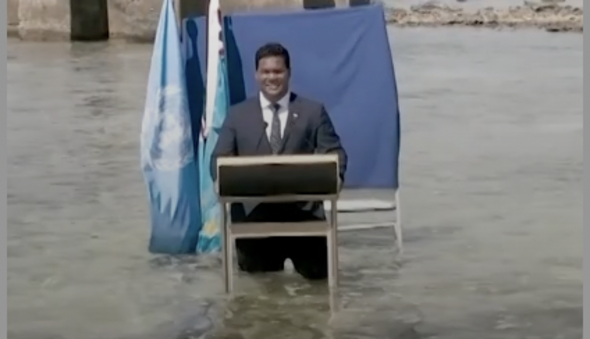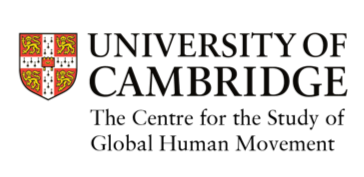
Organised by The Cambridge Centre for the Study of Global Human Movement in association with Cambridge Zero
Climate change and environmental disasters drive and disproportionately impact displaced people, refugees and migrants. In 2020, environmental disasters were responsible for 30.7 million newly displaced persons worldwide (IDMC 2021), with the vast majority linked to climate-related issues. Despite a growing body of research into the links between migration and the environment there is still a relative lack of interdisciplinary conversation. In response, this event will bring together experts from a wide variety of disciplines and professions to generate knowledge sharing, debate, and policy suggestions.
Agenda
Keynotes
Where to from here? Displacement in a time of environmental degradation, climate change and disaster
Madeline Garlick, Senior Legal Coordinator, Division of International Protection, Policy, and Law Service, UNHCR
Abstract. There is increasing recognition of the challenges around human mobility, including displacement, refugee protection and migration, in the context of environmental degradation, climate change and disaster, including most recently in the COP26 and the latest report from the IPCC. Yet political sensitivities and differing State perspectives complicate discussions on how to address the phenomenon more effectively, and hinder progress and concrete action. The presentation will examine debates around the application of existing refugee law, and what more is needed to protect human rights in this context. It will consider the relevance of the 1951 Refugee Convention and regional refugee treaties; the role of human rights law; and whether a new international treaty is needed - or possible - to ensure the protection of people forced to flee in the context of climate change, disasters, and environmental crisis. It will ask what measures, if any, international law requires to avert displacement; to help people move with a degree of choice; and to respond to needs if and where people are displaced. It will look at the interaction between the legal principles governing refugee movements and displacement on the one hand, and migration on the other - and the directions in which the law is evolving, in light of political realities and increasing needs.
Bio. Dr Madeline Garlick is currently Senior European Union (EU) Affairs officer with the United Nations High Commissioners for Refugees (UNHCR) in Brussels, in charge of Liaison between UNHCR and the EU institutions on refugee and asylum law and policy issues. From 1997-1999, she worked in Bosnia and Herzegovina, with the Commission for Real Property Claims of Displaced Persons and Refugees and the Office of the High Commissioner. She served on the Secretary General’s negotiating team which sought to resolve Cyprus’ political conflict between 1999 and 2004.
Migrants and diasporas as leaders for climate change: tapping into the human, financial, and social capital
Tauhid Pasha, Officer in Charge, International Organization for Migration UK (IOM UK)
Abstract. The migration-climate change nexus is a critical and complex one. So far, the main focus has been on migration driven by climate change and its knock-on effects. Less attention has been paid to the opportunities that migration can bring to countries transitioning towards low-carbon, environmentally sustainable futures. To achieve global goals in adaptation and decarbonisation within the agreed time frame, transformation needs to happen at an unprecedented speed. This requires countries to bring everyone to the table, including migrants and diasporas. Without de-emphasising the ethical responsibility of emitting countries towards mitigation and financing adaptation, there is much that migrants and diasporas can contribute to in achieving these goals. Migrant and diaspora remittances can support adaptation at the household and community level by, for example, helping to pay for more climate-resilient infrastructure and practices. Diasporas are also active on the political scene in both countries of origin and residence and can thus influence governments to pursue ‘net zero’, sustainable growth. By understanding the local context back home, migrants and diasporas can act as a bridge for sharing knowledge and experiences between countries. Lastly, migrants and diasporas will play an important role in the green transition. As green skills shortages are a global challenge, dynamic labour markets, allowing geographical mobility of workers, will be crucial for distributing human capital where it is most needed.
Bio. Tauhid Pasha is Officer in Charge at the UN Migration Agency’s (IOM's) UK office. At IOM’s UK office he was Senior Coordinator of a DFID-funded migrant protection programme spanning ten countries in North and West Africa. Prior to that he was Senior Specialist in Labour Mobility and Human Development at IOM's headquarters in Geneva. Tauhid previously worked in IOM's Regional Office in Cairo, as well as Amman, Jordan, advising governments and civil society across the region on issues related to labour mobility and protection of migrants'' rights. Tauhid started his international career as IOM Afghanistan's International Advisor within the Ministry of Foreign Affairs. Tauhid qualified as a solicitor in the UK where he practised immigration law and headed the immigration team of a large legal aid law firm in Birmingham. From 2001-2007 he was the Legal and Policy Director of the Joint Council for the Welfare of Immigrants (JCWI), one of the UK's leading immigration campaign organisations, before joining IOM.
Panelists
Bridging the evidence gap: the need for more data driven research into environmental migration
John Aston, Harding Professor of Statistics in Public Life, Faculty of Mathematics, University of Cambridge. Former Chief Scientific Adviser and Director-General for Science, Technology, Analysis, Research and Strategy, Home Office (2017 – 2020)
Climate change as a potential driver for migration
Emily Shuckburgh, Director of Cambridge Zero, and Professor in Environmental Data Science, Department of Computer Science and Technology, University of Cambridge
People on the move: data collection and analysis in the context of climate change
Alessandro Nicoletti, Displacement Tracking Matrix (DTM) Associate, International Organization for Migration (IOM)
ClimMobil: judicial and policy responses to climate change-related mobility in the European Union with a focus on Austria and Sweden
Monika Mayrhofer, Senior Researcher, Ludwig Boltzmann Institute of Human Rights, and Lecturer, Department of International Development, University of Vienna
Immigration policy responses to climate change and migration impact
Seema Farazi, Partner, EY
Climate Migration: a solutions-based approach to the legal vacuum
Yumna Kamel, Executive Director, Earth Refuge
Brides of drought: exploring the relationships between early marriage and climate migration in Western India
Reetika Subramanian, PhD Candidate, Centre for Gender Studies, University of Cambridge
The chronopolitics of climate change adaptation: voluntary immobility and land reclamation in Tuvalu
Liam Saddington, ESRC Postdoctoral Research Fellow, School of Geography and the Environment, University of Oxford
Environmental displacement and migration: the need for critical perspectives and epistemic due diligence
Calum Nicholson, Lecturer, Institute for Continuing Education (ICE), University of Cambridge
Migration as a force for sustainability
Maria Franco Gavonel, Post-Doctoral Research Associate, Department of Geography, University of Exeter
Mobilising resources and managing environmental stressors to flourish in a new context: the IC-ADAPT model in action
Eolene Boyd-Macmillan, Senior Research Associate, Co-Director IC research, Department of Psychiatry, Cambridge Public Health, University of Cambridge
Intersection of crises: dwindling climate finance and increasing climate migration
Nazia Habib, Director, Resilience and Sustainable Development Programme (RSDP), and Senior Research Associate, Centre for Industrial Sustainability, University of Cambridge
The health and mental wellbeing effects of climate change and
environmental migration
Tine Van Bortel, ARC Principal Investigator in Public Health & Wellbeing, University of Cambridge
Humanitarian action and environmental displacement in armed conflict: the case of Yemen
Sherine El Taraboulsi-McCarthy, Director, National Centre for Social Research (NatCen) International and Visiting Fellow, Keble College, University of Oxford
To leave or to stay? Dilemmas in light of environmental disasters in the Himalayas
Hildegard Diemberger, Lecturer, Department of Social Anthropology, University of Cambridge
Libby Peachey, Mongolia, and Inner Asia Studies Unit (MIASU) Research Coordinator, Department of Social Anthropology, University of Cambridge
Climate vulnerability and migration: A case study of Satabhaya Kendrapara, Odisha-India
Neelima Mishra, Mphil Candidate, Department of Land Economy, University of Cambridge
Relevant Publications
Alessandro Nicoletti, Displacement Tracking Matrix (DTM) Associate, International Organization for Migration (IOM)
- Human Mobility in the context of Environmental and Climate Change: Assessing current and recommended practices for analysis within DTM (link)
- Gonzalez Tejero D., Guadagno L. & Nicoletti A. (2020), “Human mobility and the environment: challenges for data collection and policy-making”, Migration Policy Practice, 10 (1): 3-10 (link)
Maria Franco Gavonel, Post-Doctoral Research Associate, Department of Geography, University of Exeter
- The migration-sustainability paradox: transformations in mobile worlds (https://doi.org/10.1016/j.cosust.2021.03.013)
- Human security of urban migrant populations affected by length of residence and environmental hazards (https://doi.org/10.1177/0022343320973717)
- Perceived environmental risks and insecurity reduce future migration intentions in hazardous migration source areas (https://doi.org/10.1016/j.oneear.2020.12.009)
- Urban sustainability and the subjective well-being of migrants: The role of risks, place attachment, and aspirations (https://doi.org/10.1002/psp.2505)
Eolene Boyd-Macmillan, Senior Research Associate, Co-Director IC Research, Department of Psychiatry, Cambridge Public Health, University of Cambridge
- Making progress possible: Improving the quality of education for vulnerable children everywhere, Learning Passport
Learning Passport SEL High Level Framework
Learning Passport Research and Recommendations - Section 4
Call for Papers
We seek proposals for papers from researchers and practitioners working across all relevant disciplines - including human and physical geography, climate science, migration studies, finance and economics, law, engineering, and sustainable development. Please send a brief abstract (250 words) to djr80@cam.ac.uk. Please register interest by March 4th. Deadline to submit an abstract is March 11th.
Topics of interest include, but are not limited to:
- Political, economic, and social effects of environmental migration
- Immobility and trapped populations
- Using environmental data to inform migration research
- Climate finance, legal protection, and resettlement needs
- Institutional and normative frameworks for environmental justice
- Impact on human health and health systems
- Histories of environmental migration
- Innovations, adaptations, and policy responses
This event is free to attend and will include refreshments and lunch. Those interested in attending only should email Daniel Robins djr80@cam.ac.uk to confirm their place asap.



